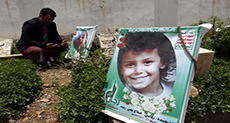
The US Will Rearm KSA to the Tune of $1.5 Billion as Airstrikes Resume in Yemen

Max Bearak
This week, the Pentagon announced its intention to sell $1.5 billion in armaments, tanks, and military advisory support to Saudi Arabia. If that sounds like a major deal, consider that the United States sold more than $20 billion worth of military equipment and support to the Saudis last year. And this is an alliance that goes back decades.

All of that and much more from the United States is put to use in the fierce war that the Saudi military is waging against Shiites in Yemen. For instance, the Saudis command US-made fighter jets that drop US-made cluster bombs - a munition that is so imprecise that it has been banned by 119 nations. The US provides targeting assistance, intelligence briefings and even daily aerial jet refueling for the Saudis and their coalition partners, which are mostly other oil-rich Gulf nations.
The proposed sale comes as the Saudis restart an aerial campaign against the Houthis, who now control huge portions of Yemen, including the capital Sanaa. Despite attempts at cease-fires, the ground war has continued mostly unabated for more than a year.
The Saudis have killed hundreds of civilians since the war began. Early on Tuesday, an airstrike just outside Sanaa reportedly killed 14 civilians working the overnight shift at a factory that made potato chips. A factory official and medics told the Associated Press that the raid was carried out by the Saudi-led coalition. The factory was within an army compound that has been shelled repeatedly by the Saudis for months. The Saudi-led coalition has denied responsibility, telling Al Jazeera that it did not conduct the raid.
The war has claimed thousands of lives and displaced about 2.4 million people. Yemen is past the brink of collapse. Famine looms and medicine is scarce. More than 21 million out of 24 million people in the country need some form of humanitarian assistance, and half of the population has too little food. That is almost double the number in Syria.
In July, the United Nations released its annual Children in Armed Conflict Report, which attributed the killing of 510 children to Saudi-led coalition forces, amounting to 60 percent of the total in Yemen. Saudi Arabia was then briefly placed on a UN list of countries that maim and kill children in conflicts.
Through back channels, Saudi Arabia threatened to revoke its financial contributions to the United Nations for critical programs if it was not removed from the list. The cash-strapped United Nations relies heavily on money from wealthy Gulf countries. In short order, UN Secretary General Ban Ki-moon relented, telling reporters that he had been subjected to "undue pressure."
"I also had to consider the very real prospect that millions of other children would suffer grievously if, as was suggested to me, countries would defund many UN programs," he said.
Amnesty International and Human Rights Watch have said as recently as in June that Saudi Arabia has committed "gross and systematic violations of human rights" in Yemen. In July, Sudarsan Raghavan, a Washington Post reporter, met with victims of a US-made cluster bomb dropped by the Saudis.
In that article, Raghavan lays out a chilling portrait of the US role in Yemen's destruction. "The United States is playing a quiet but lethal role in the killing and wounding of thousands of civilians in Yemen's civil war," he wrote.
So far, calls from human rights groups and a small chorus of American lawmakers to end weapons sales to Saudi Arabia have gone unheeded. The closest the United States came to doing so was in May, when President Obama blocked a transfer of cluster bombs. A month later, Congress voted to continue sales of cluster bombs so as not to "stigmatize" their use, which the United States has reserved the right to do itself.
The Houthis ousted Yemen's US- and Saudi-backed Sunni government last year. Many have speculated that steadfast US support for the Saudi coalition stems from a desire to assuage their nerves after the United States and other world powers signed a nuclear agreement with Iran, the Saudi kingdom's great regional and sectarian rival. The Saudi-led coalition has also targeted al-Qaeda's branch in Yemen, which US officials see as the group's most dangerous affiliate.
The Saudis obviously outmatch the Houthis in firepower, especially from the air, but their campaign has been floundering. The Houthis have proved unexpectedly resilient. And the indiscriminate shelling of civilians by Saudi planes has not helped them win over the noncombatant population. The Saudis have admitted to some intelligence "shortcomings" resulting in its coalition's "mistakenly" killing scores of civilians in airstrikes, which is actually more than the United States usually does in similar scenarios.
With the Houthis in control of Sanaa, anti-American, anti-Saudi and anti-"Israeli" slogans are emblazoned on walls across the city. Graffiti depict US bombs, missiles and fighter jets killing Yemenis. There's no end to the war in sight.
Source: The Washington Post, Edited by website team
Comments



